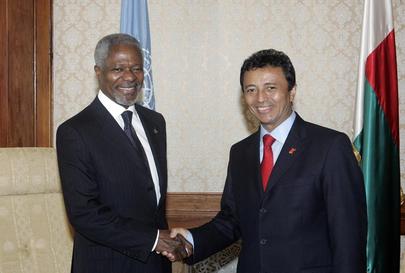
| First Pilot Country: MADAGASCAR √ |
| Alliance Madagascar |
| Global Reports |
| Proposed Projects |
| Statistics |
| First Pilot Country: MADAGASCAR |
Briefing Note
|
|
Click here to view the brochure for more information (English) | |||||||
|
|
Click here to view the brochure for more information (French) |
|
Some Facts Madagascar, the World's fourth largest island, is about 1,000 miles long and 350 miles wide at its widest point, and lies 250 miles off the East Africa coast. Economically considered a Least Developed Country, its population numbers over 18.5 million. The island has a wide variety of natural resources – graphite, chromite, coal, bauxite, salt quartz, tar sands, semiprecious stones, mica, fish and hydropower. However, the economy remains largely dependent on the exportation of agriculture products – coffee, vanilla, sugar and cotton cloth amongst others – for continued economic growth, instead of employing Madagascar’s natural resources as a source of consistent economic growth. Though, it should be noted that some of Madagascar’s natural resources – most notably exports of shellfish and chromite – have contributed to economic expansion in recent years. |
|
Agriculture is the cornerstone of the national economy – it is responsible for more than 25 percent of Gross Domestic Product (GDP) and employs 80 percent of the population. However, recently the apparel industry has seen considerable growth as a result of duty-free exports to the United States market – indeed exports to the United States now account for over 30 percent of exports. This contributed to Madagascar’s strong economic performance in 2005 that saw a 5.1 percent increase in GDP. Unfortunately, Madagascar’s strong economic performance has not yet been translated into tangible gains for most Malagasy as the World Bank has estimated that 70 percent of the population continues to live on less than a US$ 1 a day. Below: Rice fields in the district of Ambatondrazaka, Madagascar, 01 January 1979 (UN Photo: Lucien Rajaonina)
|
 Above: Secretary-General Kofi Annan (left) shakes hands with Marc Ravalomanana at the Presidential Palace when Mr. Annan called on the President, in Antananarivo, Madagascar, 16 March 2006. (UN Photo: Eskinder Debebe) Rural development is a particular concern because the vast majority of those living on less than US$1 a day are from rural areas. Moreover, though agriculture is the driving force of the economy, the fluctuations in agriculture production due to environmental conditions (cyclones) and changes in commodity prices (oil) further imperils rural areas’ long-term economic performance. Thus the eradication of poverty from rural areas is critical to the realization of the internationally agreed development goals, including the Millennium Development Goals. |
|
Programme Priorities: A facilitator and a matchmaker, the Alliance-Madagascar, the country-level implementing mechanism, works in:
New York Mission: Permanent Mission of
the Republic of Madagascar to the United Nations |
|
